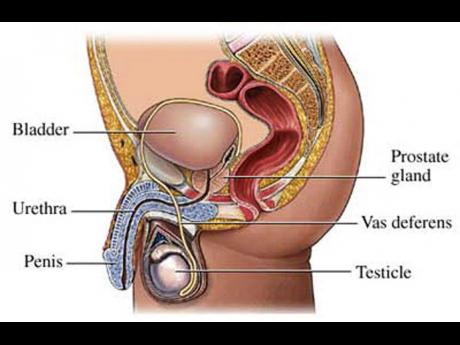What every man should know about prostate cancer
YOUR PROSTATE gland is an important part of your reproductive anatomy and your sexual health. You may think of prostate health as a concern for middle-age people and onward, but it helps to get a head start on understanding healthy prostate function and how best to take care of yourself. While the risk of prostate health issues tends to increase as you enter middle age, all men are at risk for prostate problems.
This walnut-sized gland is important in producing seminal fluid, a key component of semen, which allows sperm to travel from the penis. The prostate is responsible for closing off the urethra, the tube that carries urine and semen out of the body when ejaculating. It also contains an enzyme (5-alpha-reductase) that converts testosterone into dihydrotestosterone, which, in addition to regulating prostate function, is vital for secondary sex characteristics like facial hair.
There are three common problems that affect the prostate – prostatitis, benign prostatic hyperplasia and prostate cancer. Prostatitis is the most common prostate condition in men under 50, and it typically consists of inflammation and swelling. Bacterial infection can also cause acute prostatitis, and if an inflammation lasts longer than three months, it can become chronic prostatitis.
Benign prostatic hyperplasia, or enlarged prostate, is the most common condition in men over 50. Once the prostate gets larger, it can press on the urethra, making it harder to empty your bladder and possibly prevent it entirely if it gets bad enough.
Prostate cancer is the most common form of cancer in men, affecting one in nine over their lifetime. A diagnosis of this condition typically starts at around 65, but because the cancer is often slow growing, only one in 35 men die of it. However, some forms of prostate cancer are more aggressive and deadly, so it is important to get regular screenings as recommended by your doctor to detect it early on.
Consultant urologist Dr Marie Brown said prostate cancer occurs when the cells within the prostate gland undergo abnormal changes and grow. They develop the ability to grow uncontrollably and spread outside of the prostate.
“Prostate cancer is diagnosed on screening when men have no symptoms. A blood test for the prostate specific antigen (PSA) looking at levels greater than 3 ng/ml or 4 ng/ml (most commonly used laboratory value). The level of the PSA varies with age as well. The digital rectal examination (DRE) is also done to feel the surface of the prostate where most of the malignant changes in the prostate take place,” Dr Brown said.
Typical symptoms of prostate problems include poor bladder control, urinary urgency, a weak urine stream, or difficulty starting or stopping urination. Problems with your prostate can also create issues with sexual function, urinary tract infections, bladder stones, and even kidney failure.
“The early stages of prostate cancer have no symptoms. In later stages, men may have problems with urination such as straining, increased urinary frequency, blood in the urine (hematuria), inability to pass urine, and waking up multiple times in the night to pass urine. In even later stages, they may be unable to walk due to spread to the spine with compression of the nerves, unable to pass urine, and blockage to the kidneys. Some men may even present with swelling to the lower limbs due to lymph node infiltration by cancer,” Dr Brown said.
According to Dr Brown, Jamaica has a high-risk population and as such, prostate cancer is very prevalent. The Globocan (WHO) publication in 2020 reported that 1,561 new cases were detected in Jamaica. This was greater than all other cancers.
“The overall incidence of prostate cancer is 87.6 per 100,000 men. This is the highest of all cancers. The death rate is equally as high, with 39.4 per 100,000 men. When compared to breast cancer in women, with incidence and death rates of 66.9 per 100,000 and 34.1 per 100,000, respectively, prostate cancer is more common,” Dr Brown said.
Prostate cancer treatment is dependent on whether there is metastatic disease or not. For the non-metastatic group, based on the risk stratification, there is the potential for cure, and these men can be treated with the surgical removal of the prostate or radiation to the prostate either internally (brachytherapy) or with external beam radiotherapy. Some men may benefit from a combination of surgery and radiotherapy as well.
“The men with metastatic prostate cancer are usually treated with hormonal therapy in addition to chemotherapy or other therapy aimed at further reducing the hormone levels. The patient will require continued follow-up to ensure that the therapy is working by monitoring the PSA levels and the symptoms,” Dr Brown said.
Patients, she said, can be early stage (stages I and II), locally advanced (stage III), or advanced stage (stage IV). “As urologists, we use multiple parameters to classify men into low, intermediate, and high risk and place them in the various stages. There is a group of men who present with disease that has already spread to small areas. We call that oligometastatic prostate cancer,” Dr Brown said.
The month of September is being celebrated as prostate cancer awareness month. Dr Brown is encouraging all men over 40 years old to get their screening tests – DRE and PSA - done.
“The Jamaica Cancer Society has sites over the island to facilitate this. This can be done by a general practitioner or a urologist as well. Throughout the year, men who did not get an opportunity to do these tests can also have them done,” Dr Brown said.


